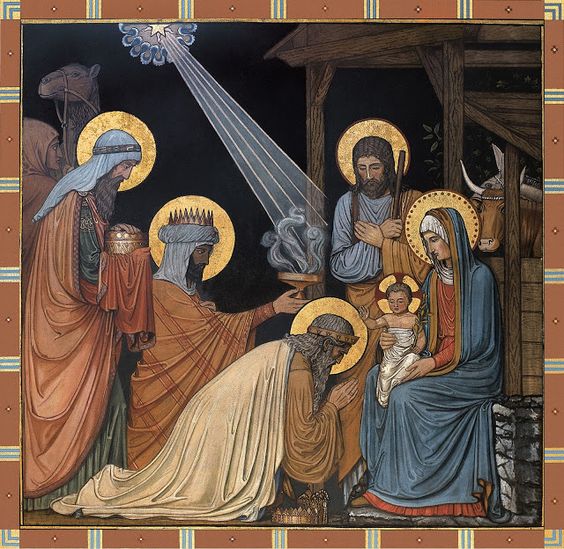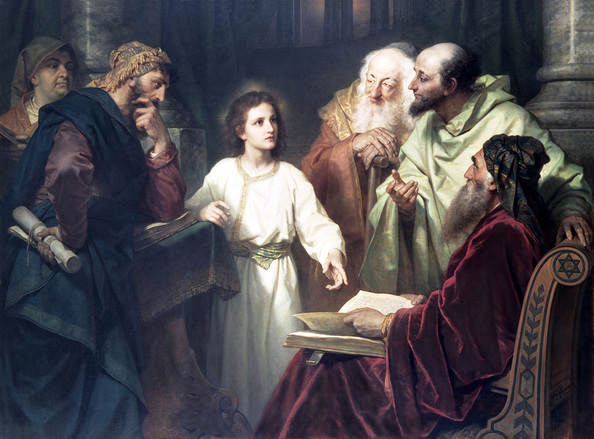We have seen the true light
![]() The Epiphany Mystery–Events
The Epiphany Mystery–Events
The mystery of the Epiphany or, if you will, of the Theophany — that is, of the appearing of God in the midst of men — continues to unfold before the eyes of our souls and to resound in the ears of the our hearts. Each of the mysteries of the Epiphany, beginning with the adoration of the Magi, and continuing in the liturgy with the Gospels of the baptism of the Lord (John 1:29–34), of the wedding feast at Cana (John 2:1–11), of the cleansing of the leper (Matthew 8: 1–5), and of the calming of the great tempest (Matthew 8:23–27), puts us in real contact with the adorable divinity of Jesus Christ, revealed in human flesh, and operating through that sacred flesh to give light to those in darkness, to lift up the fallen, to heal the sick, to reconcile men to God, and to open the kingdom of heaven to us while we are yet on earth. Each of these mysteries of the Epiphany operates in a manner proper to the event it makes present.
Today’s Grace
How, then, are we to lay hold of the grace proper to today’s feast of the Baptism of the Lord? While the chants of the Mass and the lesson are those of January 6th — so that we not lose the thread that ties today’s feast to the illumination of the nations and the adoration of the Magi — the Collect, Gospel, Secret, and Postcommunion are proper to the Baptism of the Lord. This means that if we are to look anywhere for the special grace of today’s feast, it is in these elements of Holy Mass.
If one wants to know what God is offering one on any given day, one must open one’s missal and there, in the prayers of the Mass, discover those things for which the Church is asking. One may want other things. One may have other ideas. One may think one needs certain graces. The Church, however, in the sacred liturgy always asks for exactly the things one needs. To receive these things one must practice a certain abnegation. One must say to one’s soul:
My soul, thou hast thy desires; leave them all aside and enter into the desires of God. Thou hast thy plans and thy dreams; let go of them and lay hold of the plan of God so as to fulfil His dreams for thee. Thou hast thy preoccuptions, thy worries, thy anxieties, and thy needs; seek to discover what God would give thee, and ask for that thing. If thou askest for what God already desireth to give thee, thou art asking rightly and will be heard promptly, for God is quick to grant the things for which He Himself moveth us to ask.
Inwardly Reformed
The Collect makes us ask that “we may be inwardly reformed by Him, whom we recognise to have been outwardly like unto ourselves”.
O God, Whose only-begotten Son appeared in the substance of our flesh, grant, we beseech Thee, that we may be inwardly reformed by Him, whom we recognise to have been outwardly like ourselves. (Collect of the Mass)
This is not a grace for which we would, of ourselves, dare ask. It is a risky thing to say to God. “reform me inwardly” because most of us, I think, are resistent to reform. We do not like change, especially when that change touches us personally. I am reminded of what Satan said to God in the first chapter of the book of Job: “Stretch forth thy hand a little, and touch all that he hath, and see if he blesseth thee not to thy face” (Job 1:11). We Benedictines are in a most peculiar bind. We have made profession of conversatio morum. This means that we have given God full and unlimited permission to change us as He sees fit, and this over a whole lifetime. One doesn’t enter a monastery to be safe, and comfortable, and cosy. One enters to take the great risk, saying to God: “Change Thou me, as Thou wilt, when Thou wilt, and in the way Thou wilt, and to Thy divine reforming action, I shall add my little Amen of adoration and submission”. Thus does Mother Mectilde write in The True Spirit:
If they cannot possess themselves in peace, reverence and attention, let them from their very heart repeat over and over again in union with the church, Amen. This word is full of mystery, it is the soul’s acknowledgement of, and consent to what God does in his Church and to what the Church does for God.
Sons in the Son
The Gospel is a great unveiling of the Most Holy Trinity. The Baptism of the Lord is the first of a series of festivals of the Most Holy Trinity. The second Trinitarian festival is the Transfiguration of the Lord on the Second Sunday of Lent and again on August 6th. The third Trinitarian festival is on the Octave Day of Pentecost, when the whole work of Redemption is summed up and turned into doxology, that is, praise of the Father, and of the Son, and of the Holy Ghost. Pray to Saint John the Baptist today; it is Saint John, the friend of the Bridegroom, who bears witness to the Most Holy Trinity:
I saw the Spirit coming down, as a dove from heaven, and he remained upon him. And I knew him not; but he who sent me to baptize with water, said to me: He upon whom thou shalt see the Spirit descending, and remaining upon him, he it is that baptizeth with the Holy Ghost. And I saw, and I gave testimony, that this is the Son of God. (John 1:32–34)
The Gospel shows us the effect of the reform that God would operate in us: the Father, by giving us the Holy Ghost, makes us sons in the son.
For whosoever are led by the Spirit of God, they are the sons of God. For you have not received the spirit of bondage again in fear; but you have received the spirit of adoption of sons, whereby we cry: Abba Father. (Romans 8:14–15)
And because you are sons, God hath sent the Spirit of his Son into your hearts, crying: Abba, Father. (Galatians 4:6)
Very few Catholics grasp the reality of their divine sonship by adoption. For too many, the great baptismal grace that is divine adoption remains something notional. something vague and, as it were, something obscure in the back of one’s mind. This is why, in every age, God raises up saints, and doctors, and mystics to call us back to what makes Christianity different from every other religion, philosophy, ethical system, and mystical meandering on the planet: divine sonship by adoption. We are, by grace, what Jesus is by nature. All the Fathers taught this. The Doctors scrutinised it and marveled at the divine condescension. Mother Mectilde seized upon this in the 17th century and wrote about it in her letters. Saint Thérèse, Blessed Abbot Marmion, Blessed Elisabeth of the Trinity, and the Venerable Itala Mela, all of these were raised up in modern times to say to souls: You are not mere seekers after wisdom, you are not slaves in submission to a remote divinity, you are not keepers of a moral order; you are sons in the Son. This is so stupendous a mystery that many put it aside and prefer to concentrate on things less unsettling.
We bring Thee offerings, O Lord, for the appearing of Thy new born Son, humbly beseeching Thee that, as He is the author of our gifts, so also He may mercifully receive them. (Secret of the Mass)
The Priestly Offering
The Secret tells that we are not only sons in Christ the Son, but also priests in Christ the Priest. The essential action of a priest is to make offerings, to be a sacrificer. The priest alone stands at the altar in the person of Christ the Head but behind him stand the whole priestly people joining with him in one single offering. The Secret calls Our Lord Jesus Christ “the author of our gifts”. We need to dwell on this phrase for a moment: we come to Holy Mass not only to receive, but also to offer. And what have we to offer except what we have received? Saint Paul says, “What hast thou that thou hast not received? And if thou hast received, why dost thou glory, as if thou hadst not received it?” (1 Corinthians 4:7). This is the great movement of the Mass: we offer what we have received, and then receive what we have offered. Saint John of the Cross makes us aware of all that we have received:
Mine are the heavens and mine is the earth. Mine are the nations, the just are mine, and mine the sinners. The angels are mine, and the Mother of God, and all things are mine; and God Himself is mine and for me, because Christ is mine and all for me. What do you ask, then, and seek, my soul? Yours is all of this, and all is for you. (Prayer of a Soul Taken With Love)
With Clear Sight
The Postcommunion is a prayer not only for today but every day on which we find ourselves surrounded by obscurity and walking in uncertainty. It puts one in mind of Blessed John Henry Newman’s Lead, Kindly Light:
We pray Thee, O Lord, to go before us at all times and in all places with Thy heavenly light, that we may discern with clear sight and receive with the right disposition the mystery of which Thou hast willed that we should partake. (Postcommunion of the Mass)
The True Light
Today, without excluding the heavenly light of the star that guided the Magi, the liturgy would have us gaze upon the heavenly light shining upon the Face of Christ as He emerges from the waters of the Jordan. It is the same light that radiates invisibly from the Face of Christ hidden in the Sacred Host. This is the light that causes the Church to sing:
We have seen the true light; we have received the heavenly Spirit; we have found the true faith, worshiping the undivided Trinity, for the Trinity has saved us. (Divine Liturgy of Saint John Chrysostom)



A poem that speaks to your post:
The Sacrifice
This poem, O Lord, is body broken;
Bless it, take it, it is Yours.
These words, O Lord, are blood outpoured;
Bless them, take them, they are Yours.
Weak and finite is the substance;
Bless it, change it, make it new.
The form, O Lord, is poor and common;
Bless it, shape it, make it new.
O how humble is this offering!
Still, I give it up to You.
Cleanse it, purge it, sanctify it;
In Your kingdom make me new.